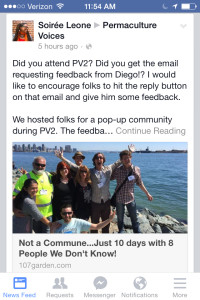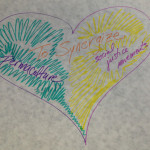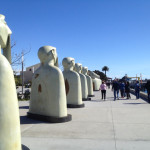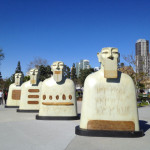Learning, the Permaculture Way was a pre-conference workshop by David Eggleton and me at the 2nd Permaculture Voices conference (PV2) in San Diego. Our session drew about 50 participants, some of whom continued a dialogue that seemed—on the surface—to have a narrow focus but, over the five days of PV2, grew wider, broader and was deepened considerably through Meet-Ups and collaboration with the Mycelium team of facilitators.
Working Relationships
A relationship that works is a relationship that does well with difference.
(Roger Fisher & Scott Brown)
For sustainability to function and endure, the overarching relationship that must function well is between people(s) and place(s). A resilient ability to balance the twin goals of being a Whole Person and living in a Whole Place is the aim and outcome of working well with the differences between peoples and places.
Many permies emphasize living in a Whole Place, so the Meaningful Makeover instrument brings an equal emphasis to being a Whole Person by elaborating the “Care of People” permaculture principle with insights from Stephen Covey (author of The 8th Habit and The 7 Habits of Highly Effective People).
Creatively identifying the interconnections and interdependencies between the two “paradigms” of Whole Person and Whole Place yields four working relationships that serve as touchstones for life-long learning and permaculture coaching. With the additional half-hour Diego gave us this year, we asked participants to gather in small groups organized by Working Relationship and come up with a guiding question relevant to their journey through PV2.
Two Paradigms/Four Questions
The Whole Place paradigm invokes two Working Relationships: interspecies and interelemental.
The Whole Person paradigm invokes two Working Relationships: intrapersonal and interhuman.
The overarching questions created by small groups this year were:
- Interspecies: How do we reconcile/balance our desire to integrate wildlife and net biodiversity (whole ecosystem health) with the human need for a system that ‘produces a yield’?
- Interelemental: How do my design elements fit together as a system?
- Intrapersonal: How can we become our best whole selves to care for ourselves, our communities, & the earth while at the same time welcoming the reciprocity of those things caring for us, our communities, & our earth?
- Interhuman: How do I connect with the right people, how do I properly communicate, and how do I create/find community?
Working Well with Differences, Interhumanly
Soirée noted some problems with the phrasing of the interhuman question:
I would like to point out that the three-part inter-human question resulted when we were not able to distill the community question further in the time allotted. It’s my impression that “right people” was not intended to imply some people were wrong but rather how do I find people for real connection rather than a passing fancy. [Also] I’m not entirely clear what “how do I properly communicate” meant to the contributor…
Rick pursued a different but related question: “How can I improve community stability?”
During the Meet-Ups and in the Closing Break-Out Session, we talked a fair bit about trying to increase the diversity of future Permaculture Voices conference participants and presenters. One strategy included becoming more aware of whiteness and how it can unconsciously get in the way of inclusion and diversification. More thoughts about how we/human beings can work well with the differences among us/human beings are shared at this Permavoices page. You are also invited to contribute.











